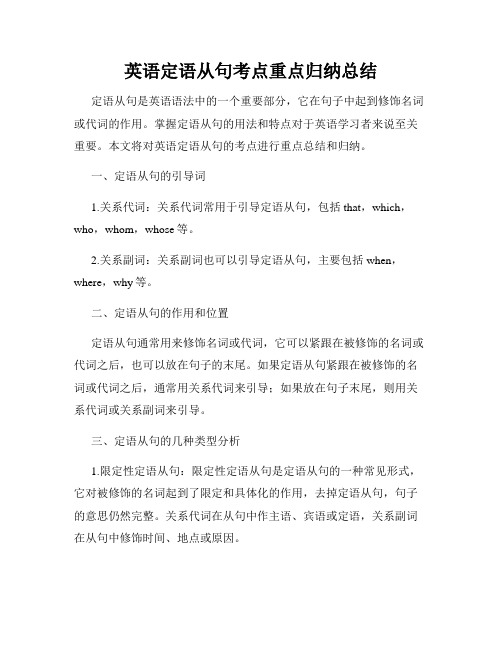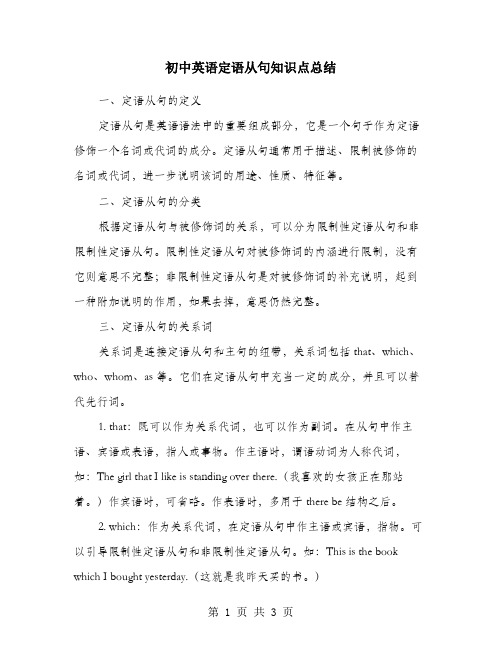初中英语语法知识—定语从句的分类汇编及解析(1)
英语定语从句考点重点归纳总结

英语定语从句考点重点归纳总结定语从句是英语语法中的一个重要部分,它在句子中起到修饰名词或代词的作用。
掌握定语从句的用法和特点对于英语学习者来说至关重要。
本文将对英语定语从句的考点进行重点总结和归纳。
一、定语从句的引导词1.关系代词:关系代词常用于引导定语从句,包括that,which,who,whom,whose等。
2.关系副词:关系副词也可以引导定语从句,主要包括when,where,why等。
二、定语从句的作用和位置定语从句通常用来修饰名词或代词,它可以紧跟在被修饰的名词或代词之后,也可以放在句子的末尾。
如果定语从句紧跟在被修饰的名词或代词之后,通常用关系代词来引导;如果放在句子末尾,则用关系代词或关系副词来引导。
三、定语从句的几种类型分析1.限定性定语从句:限定性定语从句是定语从句的一种常见形式,它对被修饰的名词起到了限定和具体化的作用,去掉定语从句,句子的意思仍然完整。
关系代词在从句中作主语、宾语或定语,关系副词在从句中修饰时间、地点或原因。
2.非限定性定语从句:非限定性定语从句是用来对被修饰的名词进行补充说明或者陈述一些额外信息的。
非限定性定语从句通常用逗号或者破折号与主句隔开,去掉定语从句对整个句子的意思没有太大影响。
四、定语从句的连接词使用注意事项1.关系代词that和which的区别:that通常用来引导限定性定语从句,which则常用于非限定性定语从句。
2.关系代词who和whom的区别:who用来引导指人的定语从句,并在从句中担任主语或者宾语;whom通常用于非限定性定语从句,担任宾语。
3.关系代词whose的用法:whose用来引导定语从句,表示所属关系。
5.关系副词when,where和why的用法:when用来表示时间,where表示地点,why表示原因。
五、定语从句的注意事项1.省略关系词:当关系从句中作主语、宾语或者介词宾语时,关系词(常用的是that或which)可以省略。
定语从句知识点归纳

定语从句知识点归纳定语从句是英语语法中的一个重要部分,它在句子中起到修饰、限定名词或代词的作用,能够使句子表达更加准确、丰富。
接下来,让我们详细地了解一下定语从句的相关知识点。
一、定语从句的定义定语从句是指在复合句中,修饰名词或代词的从句。
被定语从句修饰的名词或代词叫先行词,引导定语从句的词叫关系词。
关系词分为关系代词和关系副词。
二、关系代词1、 thatthat 既可以指人也可以指物,在定语从句中作主语、宾语或表语。
例如:The book that I bought yesterday is very interesting(that 在从句中作宾语,指代“book”)2、 whichwhich 指物,在定语从句中作主语、宾语。
例如:The house which is near the river is very old(which 在从句中作主语,指代“house”)3、 whowho 指人,在定语从句中作主语、宾语。
例如:The man who is standing there is my teacher(who 在从句中作主语,指代“man”)4、 whomwhom 指人,在定语从句中作宾语。
例如:The girl whom you met yesterday is my sister(whom 在从句中作宾语,指代“girl”)5、 whosewhose 既可以指人也可以指物,表示所属关系,在定语从句中作定语。
例如:The man whose car was stolen called the police(whose 在从句中作定语,修饰“car”)三、关系副词1、 whenwhen 表示时间,在定语从句中作时间状语。
例如:I still remember the day when I first met you(when 在从句中作时间状语,指代“the day”)2、 wherewhere 表示地点,在定语从句中作地点状语。
初中英语定语从句知识点总结

初中英语定语从句知识点总结一、定语从句的定义定语从句是英语语法中的重要组成部分,它是一个句子作为定语修饰一个名词或代词的成分。
定语从句通常用于描述、限制被修饰的名词或代词,进一步说明该词的用途、性质、特征等。
二、定语从句的分类根据定语从句与被修饰词的关系,可以分为限制性定语从句和非限制性定语从句。
限制性定语从句对被修饰词的内涵进行限制,没有它则意思不完整;非限制性定语从句是对被修饰词的补充说明,起到一种附加说明的作用,如果去掉,意思仍然完整。
三、定语从句的关系词关系词是连接定语从句和主句的纽带,关系词包括that、which、who、whom、as等。
它们在定语从句中充当一定的成分,并且可以替代先行词。
1. that:既可以作为关系代词,也可以作为副词。
在从句中作主语、宾语或表语,指人或事物。
作主语时,谓语动词为人称代词,如:The girl that I like is standing over there.(我喜欢的女孩正在那站着。
)作宾语时,可省略。
作表语时,多用于there be结构之后。
2. which:作为关系代词,在定语从句中作主语或宾语,指物。
可以引导限制性定语从句和非限制性定语从句。
如:This is the book which I bought yesterday.(这就是我昨天买的书。
)3. who/whom:作为关系代词,在定语从句中作主语或宾语。
指人。
who在从句中做主语,whom在从句中做宾语。
如:The teacher who is standing there is my English teacher.(站在那的老师是我的英语老师。
)4. as:作为关系代词,在定语从句中作主语、宾语或表语,既可指人也可指物。
例如:He is an artist as we all know.(他是一位我们大家都知道的艺术家。
)四、定语从句的用法1. 限制性定语从句通常紧跟在被修饰词之后,有逗号隔开。
初中定语从句知识梳理

初中定语从句知识梳理一、定语从句的概念定语从句是由一个句子充当另一个句子的定语,用来修饰名词或代词。
定语从句在句中充当形容词,起到限定或补充说明修饰作用。
二、定语从句的引导词常用的定语从句引导词有:关系代词和关系副词。
1.关系代词:that, who, whom, whose, which2.关系副词:where, when, why三、引导词的用法和区别1.关系代词的用法和区别:(1)that:1)作主语或宾语时,可以先行词是人也可以是物。
2)不能用于非限制性定语从句。
(2)who/whom:1)who作主语时,先行词必须是人。
2)whom作宾语时,先行词必须是人。
3)非限制性定语从句一般用who;宾语从句的引导词只能用whom。
(3)which:1)作主语或宾语时,先行词必须是物。
2)非限制性定语从句一般用which;宾语从句的引导词只能用which。
(4)whose:1)表示"……的",用于人或物,用来修饰名词。
2)通常在定语从句中作用是轻微的。
2.关系副词的用法和区别:(1)where:在定语从句中修饰地点,相当于介词+ which。
(2)when:在定语从句中修饰时间,相当于介词+ which。
(3)why:在定语从句中修饰原因,相当于介词+ which。
四、定语从句的基本结构1.先行词+定语从句引导词+其他成分2.定语从句引导词+先行词+其他成分五、易错点以及注意事项1.区分定语从句和宾语从句:定语从句修饰名词或代词,而宾语从句作动词的宾语。
2.先行词的重复性:定语从句中一般不再重复先行词。
3.谓语动词的变化:定语从句中的谓语动词根据先行词的数和人称变化。
4.引导词的选择:根据先行词的不同特点,选择适当的引导词。
初中英语知识点归纳定语从句的种类及用法

初中英语知识点归纳定语从句的种类及用法定语从句是英语语法中的一个重要部分,它用来修饰名词或者代词。
在初中英语中,掌握定语从句的种类及用法对于提高语言表达能力具有重要意义。
本文将对初中英语中定语从句的种类及用法进行归纳总结。
一、限制性定语从句限制性定语从句用来对被修饰的名词进行进一步的限制和说明,如果去掉限制性定语从句,句子的意思就会发生改变。
1.关系代词引导的限制性定语从句关系代词who, whom, whose, which和that可以引导限制性定语从句。
例如:The girl who is standing over there is my sister.(那个站在那儿的女孩是我的妹妹。
)The book that I bought yesterday is very interesting.(我昨天买的那本书非常有趣。
)2.关系副词引导的限制性定语从句关系副词where, when, why可以引导限制性定语从句。
例如:This is the school where I study.(这是我上学的学校。
)I still remember the day when we met for the first time.(我仍然记得我们第一次见面的那一天。
)二、非限制性定语从句非限制性定语从句用来对被修饰的名词进行补充说明,如果去掉非限制性定语从句,句子的意思仍然完整。
1.关系代词引导的非限制性定语从句关系代词who, whom, whose, which和that可以引导非限制性定语从句。
与限制性定语从句不同的是,非限制性定语从句之后要用逗号与主句分开。
例如:Tom, who is my best friend, is very good at playing basketball.(汤姆,他是我的最好的朋友,非常擅长打篮球。
)This is my car, which was a gift from my parents.(这是我父母送给我的车。
(完整版)定语从句语法详解

定语从句语法专题(Attributive Clauses)教案一. 定语从句的概述:1.定语从句:在复合句中,修饰某一名词或代词的从句叫定语从句。
在句中做定语,被修饰的名词或代词,叫做先行词。
从句通常放在先行词之后,由关系词(关系代词或关系副词)引导。
其作用是作定语修饰主句的某个名词性成分,相当于形容词,所以又称为形容词性从句,一般紧跟在它所修饰的先行词后面。
eg She is the girl(who got the first prize.)girl先行词who充当从句主语, 从句做定语修饰girlThis is the boy who broke the window.这就是打破窗子的孩子。
the boy是先行词, who broke the window是限制性定语从句, 明确指出theboy是打破窗子的那个孩子,who 在从句中充当主语That is the house where he lived ten years ago.He is the man who/that lives next door.He is the man who I want to see.先行词关系词定语从句复合句: 是由一个主句和一个或一个以上的从句构成的句子, 复合句中的主句和从句都具有完整的的主语和谓语, 主句是复合句的主体, 可以独立存在, 从句需要有一个连词引导, 是修饰说明主句的, 不能独立存在, 根据在句中的不同作用, 从句可以分为三类: 定语从句, 名词性从句, 状语从句。
二. 引导定语从句的关系词有两大类:1.关系词:引导定语从句的关联词称为关系词,关系词有关系代词和关系副词。
关系代词: that, who, whom, whose, which, as(主, 宾, 定)关系副词: when, where, why.(状语)2.关系词的作用:(1)引导定语从句, 在先行词和定语从句之间起连接作用;(2)代替先行词在句中充当成分。
初中英语定语从句语法及考点归纳
初中英语定语从句语法及考点归纳定语从句是英语中一个非常重要的语法结构,它可以用来修饰名词、代词等,在句子中起到限定、补充、说明的作用。
本文将对初中英语中的定语从句语法进行归纳,并列举一些常见的考点。
一、定义及基本结构定语从句是由关系词引导的从句,在从句中修饰先行词。
关系词常见的有:that, which, who, whom, whose, when, where等。
定语从句的基本结构:关系词 + 主语 + 谓语 + 其他成分例如:1. The pen that I bought yesterday is very expensive.2. The book which is on the table is mine.3. David is the person who helped me.二、关系代词和关系副词的用法区别1. 关系代词用来代替先行词,并在从句中充当成分。
- that: 用来代替人或物,作主语或宾语,指代整个句子或先行词是不定代词、序数词、all, few, little, much, no, some, any等。
- which: 用来代替物,在从句中作主语或宾语。
- who: 用来代替人,在从句中作主语。
- whom: 用来代替人,在从句中作宾语。
- whose: 用来表示所属关系,在从句中修饰名词。
- when: 用来代替时间,在从句中作状语。
- where: 用来代替地点,在从句中作状语。
2. 关系副词用来引导定语从句,并在从句中充当状语。
- when: 用来引导时间状语从句。
- where: 用来引导地点状语从句。
- why: 用来引导原因状语从句。
三、定语从句的特殊情况1. 关系代词和关系副词可以省略。
例如:- The book (which/that) he bought is interesting.- This is the place (where) we met last time.2. 关系代词在从句中做宾语时可以省略。
中考定语从句知识点总结
中考定语从句知识点总结一、定语从句的概念定语从句是修饰名词或代词的从句,通常用来说明这个名词或代词的特征、性质、身份、情况等。
定语从句是英语语法中的一个重要知识点,也是中考语法中的重点内容之一。
二、定语从句的分类1. 关系代词引导的定语从句关系代词有:who, whom, whose, which, that 等。
例如:This is the book that I bought yesterday.(这就是我昨天买的书。
)2. 关系副词引导的定语从句关系副词有:when, where, why 等。
例如:Do you still remember the day when we first met?(你还记得我们第一次见面的那一天吗?)三、定语从句的结构关系代词引导的定语从句结构为:关系代词+谓语+其他成分。
例如:The man who is talking with my father is a famous writer.(和我父亲在谈话的那个人是一位著名的作家。
)关系副词引导的定语从句结构为:关系副词+谓语+其他成分。
例如:This is the place where we used to play when we were children.(这就是我们小时候经常玩耍的地方。
)四、定语从句的用法1. 修饰名词或代词定语从句常常用来修饰名词或代词,说明其特征、性质、身份等。
例如:The girl who wears a red dress is my sister.(穿红裙子的那个女孩是我姐姐。
)2. 引导并且限制先行词定语从句常常用来引导并且限制先行词的范围,使其具有特定的指代含义。
例如:I like the book that you lent me.(我喜欢你借给我的那本书。
)3. 用来说明特定情况定语从句还常常用来说明特定情况,以便更准确地描述或说明特定的情况。
例如:Do you know the reason why she left?(你知道她离开的原因吗?)五、定语从句的语法操练1. 先行词定语从句一般都有一个先行词,先行词前后所在的句子中都不可缺少,主要是为了给定语从句找到位置做准备。
定语从句 知识点讲解
定语从句知识点讲解定语从句是英语语法中的一个重要部分。
它用来修饰名词或代词,给出更多的信息,进一步限定或说明这个名词或代词。
一、定语从句的引导词在定语从句中,关系代词和关系副词是引导词,它们引导定语从句的开始,起到连接作用。
1. 关系代词:关系代词有who, whom, whose, which, that五个。
- Who用于表示人,在从句中做主语或宾语:This is the man whohelped me.- Whom用于表示人,在从句中做宾语:This is the man whom I met yesterday.- Whose用于表示人或物,在从句中做定语修饰:This is the man whose car was stolen.- Which用于表示物,在从句中做主语或宾语:This is the book whichI borrowed from the library.- That用于表示人或物,在从句中做主语或宾语,通常用于非限制性定语从句:This is the house that Jack built.(限制性)This is the house, which Jack built.(非限制性)2. 关系副词:关系副词有where, when, why三个。
第1页/共4页- Where用于表示地点,在从句中做状语:This is the place where we met.- When用于表示时间,在从句中也做状语:This is the time when we had a meeting.- Why用于表示原因,在从句中也做状语:This is the reason why he was late.二、定语从句的位置定语从句可以放在名词前面或后面,它是修饰名词的重要手段。
1. 定语从句放在名词前面:This is the book that I borrowed from the library.(这是我从图书馆借来的书。
(完整版)初中定语从句总结用法大全
定语从句走进中考定语从句的难点在于学生分析不清楚先行词,不能正确使用关系代词和关系副词,不能正确理解定语从句中的一些特殊用法。
中考对于定语从句的掌握要求如下:1. 掌握关系代词的用法,特别是that,which ,who,whomwhose作主语、表语和定语的用法。
2. 掌握关系副词when, where,why引导定语从句的用法;3. 掌握“介词+关系代词”的用法,尤其是介词的选取和使用;4. 掌握关系代词that和which的用法的异同;5. 掌握表示地点或时间的名词充当先行词时,关系代词和关系副词的选择问题。
思维导图■I概念和位置定语从句定语从句位置、概念及构成关系代词引导的定语从句关系副词引导的定语从句定语从句使用的注意事项先行词和关系词定语从句的构成that引导which引导whose弓丨导whe n弓丨导where弓丨导why弓丨导只用which不用that定语从句中的主谓L 一致介词+关系代词1. 定语从句的概念和位置在句子中起定语作用的从句成为定语从句。
定语从句在句子的作用相当于形容词,故又称为形容词从句。
(在复合句中,修饰某一名词或代词的从句叫定语从句)e.g.: Do you know the girl who is singing on the stage?This is the museum which was built last year.2. 先行词和关系代词被定语从句修饰的词叫先行词。
定语从句一般放在先行词的后面。
引导定语从句的词叫关系词,指代先行词,放在先行词和定语从句之间起连接作用,同时又充当定语从句的某一个成分(主语、宾语、表语、状语等);e.g.: The man who has an umbrella in his hand is my un cle.先行词关系代词(在从句中做主语)The train which h|s just left is for She nzhe n.先行词关系代词(做主语)Let' s find a place where we can have a picnic.先行词关系副词(地点状语)关系代词二连接词+代词定语从句的构成:He has a car. + The car has 7 seats. ==He has a car and it has 7 seats. ==He has a car which has 7 seats.The hotel is very clea n. where we stayed was very clean.We met a man. + The man directed us to the factory. =>We met a man and he directed us to the factory. =>We met a man who directed us to the factory.3. 关系代词引导的定语从句出题点:A 指代人的关系代词充当主语、宾语、表语的用法;B 指代物的关系代词充当主语、宾语、表语的用法。
- 1、下载文档前请自行甄别文档内容的完整性,平台不提供额外的编辑、内容补充、找答案等附加服务。
- 2、"仅部分预览"的文档,不可在线预览部分如存在完整性等问题,可反馈申请退款(可完整预览的文档不适用该条件!)。
- 3、如文档侵犯您的权益,请联系客服反馈,我们会尽快为您处理(人工客服工作时间:9:00-18:30)。
一、选择题1.The movie ____ I have seen twice is The Wandering Earth.A.who B.that C.where D.when2.Shirley is the girl ______ taught me how to use Wechat(微信).A.whom B.which C.who3.Stephen Curry is a great basketball player ____is popular in the United States and even in China.A.which B.who C.what4.Lily doesn’t know ________ she and her friends can do to help the little boy ________ parents have left their hometown for making money.A.what; whose B.how; who C.how; whose5.―Do you know everybody came to the party?―I'm afraid not. I don't know the one you had a long talk with.A.which; that B./;whom C.that; which D.who;/ 6.—Qingdao is the most beautiful city ________ I’ve ever been to.—So it is. Many international meetings are held there every year.A.that B.which C.who D.where7.Yuan Longping is a Chinese scientist __________ is leading a research to develop sea rice. A.whose B.which C.who8.—The girls are talking about the music and the actors ________ were in the film last Saturday.—It's really a fantastic film.A.which B.who C.that D.whom9.A detective is someone ____________looks for clues to something important.A.whom B.who C.what D.which10.— Do you like the weekly talk show The Readers on CCTV?—Sure. It’s a great TV program ________ can develop the habit of reading.A.who B.whose C.what D.that11.Yang Liwei is the first Chinese astronaut ___________went into space.A.which B.who C.whose D.whom12.—Do you know the old man is talking to our head teacher?—Yes, he’s my grandfather.A.whom B.whose C.who D.which 13.“Underground” is the only word in the English language _____ begins and ends with the letters “und”.A.what B.that C.who D.whom14.— Do you know the boy over there?— The one________ is holding a ball? Oh, t hat’s my cousin Jasper.A.which B.what C.who D.whose15.Mice, dogs and monkeys were the animals _________first went into space.A.that B.whom C.whose D.what16.Lots of people like Tale of Yanxi Palace, the most popular TV play________is based upon an online novel.A.what B.who C.which D.that17.I’ll tell you everything __________ I know.A.which B.who C.that D.what18.I still remember the college and the teachers ________ I visited in London years ago. A.what B.who C.that D.which19.—Do you know the man _________ is sitting behind Lily?—Oh, he is my elder brother.A.whose B.which C.who D.whom20.You can’t imagine the difficulty I have _________ the problem.A.solving B.solved C.to solve D.solve21.Think of others more than yourself. A person______cares for others is popular everywhere. A.who B.which C.whom D.whose22.–– What are you looking for?––I’m looking for the book _______ you bought last Sunday.A.who B.when C.that23.Look at that girl _______ name is Lucy.A.who B.whose C.which D.whom24.This photo often reminds the man of his grandfather ________ died five years ago. A.which B.who C.whom D.he25.—Have you heard of Junko Tabei?—Yes, she was the first woman ________ succeeded in reaching the top of Qomolangma. A.who B.whom C.which D.that【参考答案】***试卷处理标记,请不要删除一、选择题1.B解析:B【解析】【详解】句意:我看过两次的电影是《流浪地球》。
考查定语从句关系代词辨析。
who 谁,指人并在从句中作主语的关系代词;that 无实际意义,即可指人也可指物的关系代词;where 表地点的关系副词;when 表时间的关系副词。
根据句子结构,是一个定语从句。
先行词是movie,指物,在从句中作宾语,所以用关系代词that。
故选B。
【点睛】定语从句中关系词的判断。
首先看从句中缺少的成分,如果缺时间状语或地点状语,就用关系副词when或where;如果缺宾语或主语,就用关系代词。
先行词指人,并在从句中作主语,就用关系代词who或that;先行词指物,并在从句中作主语或宾语,就用关系代词that。
2.C解析:C【解析】句意:雪莉是教会我如何使用微信的一个女孩。
whom修饰人,在定语从句中作宾语或表语;which修饰事物,在定语从句中主语或宾语,或表语。
who修饰人,在定语从句作主语,宾语或表语。
此处作为定语从句的主语,修饰the girl,故用who。
故选C。
3.B解析:B【解析】【详解】句意:Stephen Curry是一位伟大的篮球运动员,他在美国甚至在中国都很受欢迎。
本题考查定语从句的关系词。
A. which作为关系词无实义;B. who作为关系词代指人;C. what不能引导定语从句。
根据句意和结构可知,定语从句的先行词是player运动员即Stephen Curry,所以此处应填代指人的关系词who。
故选B。
4.A解析:A【解析】【详解】句意:Lily 不知道她和她的朋友们能做些什么,来帮助那个父母为了钱离开家乡的小男孩。
考查宾语从句和定语从句。
A. what什么;whose谁的;B. how如何;who谁;C. how如何; whose谁的。
根据she and her friends can do可知,此处do后面缺宾语,即“做的事情”,所以第一空用what;根据parents have left their hometown for making money是boy的后置定语,是对boy的进一步解释说明,且parents和boy之间是“所属”关系,所以第二空用whose。
故选A。
5.D解析:D【解析】【分析】【详解】本题考查:定语从句。
选项分析:which做定语从句的关系代词时指代前面的物; that 做关系代词时既可指人也可指物,who做关系代词时,指人。
whom指人,但需在从句中做宾语成分。
综合分析前后文及答案选项,依据前面的everybody可知后面用who作为关系代词,可知此处填who最合适,其中I don't know the one you had a long talk with.中the one 是talk with的宾语,此处可用whom引导,也可以省略关系代词。
完整句意为:—Do you know everybody who came to the party? —I'm afraid not. I don't know the one you had a long talk with.—你认识所有来参加聚会的人吗?—恐怕不是。
我不认识那个和你谈了很久的人。
正确答案为:D【点睛】which与that两者都可指物,常可互换。
其区别主要在于:引导非限制性定语从句时,通常要用which。
